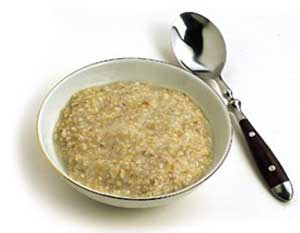When he tested his own response to a bowl of oatmeal he discovered that his blood glucose shot sky-high. He says:
If you are not diabetic and have a fasting blood sugar in the "normal" range (<100 mg/dl), you will typically have a 1-hour blood glucose of 150-180 mg/dl--very high. If you have mildly increased fasting blood sugars between 100 and 126 mg/dl, postprandial (after-eating) blood sugars will easily exceed 180 mg/dl. If you have diabetes, hold onto your hat because, even if you take medications, blood sugar one hour after oatmeal will usually be between 200 and 300 mg/dl.On the other hand, Gary Zeolla, the author of Fitness for One and All, also tested his response to oats, and his results aren't anywhere near as dramatic:
This is because oatmeal is converted rapidly to sugar, and a lot of it. Even if you were to repeat the experiment with no dried or fresh fruit, you will still witness high blood sugars in these ranges. Do like some people and pile on the raisins, dried cranberries, or brown sugar, and you will see blood sugars go even higher.
Blood sugars this high, experienced repetitively, will damage the delicate insulin-producing beta cells of your pancreas (glucose toxicity). It also glycates proteins of the eyes and vascular walls. The blood glucose effects of oatmeal really don't differ much from a large Snickers bar or bowl of jelly beans.
The steel cut oats and quick oats both produced low glycemic responses, spiking the blood sugar into the 90s then dropping it to the mid-70s. But the old-fashioned oats only spike the blood sugar into the mid-80s, and then it also drops into the mid-70s. So of the three, old-fashioned oats gives the lowest response. So that is my oatmeal of choice.So who is correct? It appears that different people can obtain significantly different results.
I also tried some "Irish Style Oats." Like quick oats, they take two minutes to cook in the microwave, and the response was about the same as for quick oats.
If you have blood glucose testing strips, the best thing is probably to test your own body's response before making up your mind. Perhaps oats really are not as good for you as the cereal corporations would like you to believe.
* Oats are normally gluten free, but some gluten may be found in the packaging when they come from a facility where other gluten-containing products are processed.

No comments:
Post a Comment